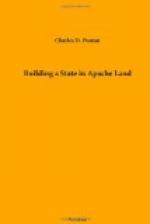Lieutenant Bascomb’s command pursued some Apaches, who had been raiding in Sonora, into the Whetstone Mountains, where they called a parley. The Apaches were summoned to camp under a white flag; and feeling perfectly innocent of having committed a crime against the Americans, fearlessly presented themselves before Lieutenant Bascomb and his boys in blue. They positively denied having seen the boy or stolen the oxen; and they told the truth, as was well known afterward; but the Lieutenant was not satisfied, and ordered them seized and executed.
Four Apache chiefs were seized and tied. Cochise (in the Apache dialect Wood) managed to get hold of a knife, which he had concealed, cut his bonds, and escape. He was a very brave leader, and after having wreaked a terrible vengeance for the treachery of American troops to the Apaches, died in peace at the Indian Agency in the Chiricahua Mountains, 1874.
The war thus inaugurated by this Apache chieftain lasted fourteen years, and has scarcely any parallel in the horrors of Indian warfare. The men, women, and children, killed; the property destroyed, and the detriment to the settlement of Arizona cannot be computed. The cost of the war against Cochise would have purchased John Ward a string of yokes of oxen reaching from the Atlantic to the Pacific; and as for his woman’s son, Micky Free, he afterwards became an Indian scout and interpreter, and about as infamous a scoundrel as those who generally adorn that profession. I am on very friendly terms with him and all his family, and would not write a word in derogation of his character, or of his step-father, John Ward, but to vindicate history.
The Vigilance Committee of San Francisco sent a considerable number of unsavory immigrants to Arizona, who with the refugees from Mexico, Texas and Arkansas, rendered mule property rather insecure in the early days. Gambling has been an industrial pursuit since the first settlement of the country, and the saloon business flourishes with the prosperity of the times. Strange to say, amidst this heterogeneous population there has never been a vigilance committee.
The Company and the country (synonymous terms) continued to improve, with occasional interruptions by the Apaches, until the beginning of 1861, when the reverberations of the gun fired at Sumter were heard in the Arizona mountains. A newspaper had been started by the company at Tubac, called The Arizonian. Our mail came overland by Butterfield coaches, at the rate of a hundred miles a day, but at last we waited for “the mail that never came.” In the spring of 1861 a coach was started out from the Rio Grande with thirteen of the bravest buckskin boys of the West, and ten or twelve thousand dollars in gold, to pay off the line and withdraw the service; but the Apaches waylaid the coach in Stein’s Pass, killed all of the men, and captured the gold.
In the month of June the machinery was running smoothly at Arivaca, the mines were yielding handsomely, and two hundred and fifty employees were working for good wages, which were paid punctually every Saturday afternoon.




